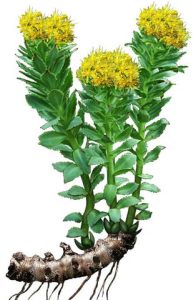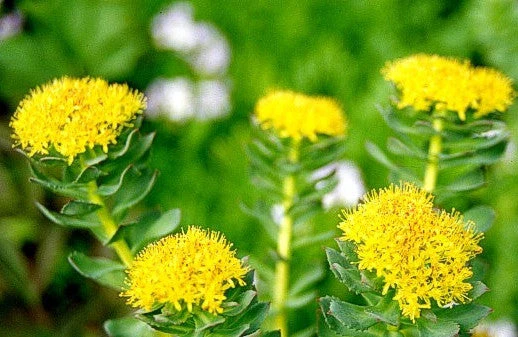Rhodiola, or Rhodiola Rosea as its full name, is a very remarkable herb with a long list of success in the treatment of various conditions. As a very potent adaptogen, it is known to control hormone levels and consequently battle stress and strengthen the immune system. There are many other names for the rhodiola herb, such as Arctic Root, Golden Root, Hongjingtian, King’s Crown, Orpin Rose, Racine d’Or, Rhodiole, Rose Root – there are probably around 30 or so more.
Rhodiola is believed to be a ‘tonic herb’, and enjoys a growing climate in sub-arctic and alpine conditions, usually gained at altitude, where it happily grows wild. Consequently, regions such as North-east China, Tibet, Siberia and Mongolia are perfect for the production of this herb. Inhabitants of these regions have used rhodiola to brew a tea-like drink for many centuries, in order to sustain energy levels that are badly needed in these climatic conditions. Rhodiola will also survive keenly in certain parts of Scandinavia, Northern parts of the USA and Alaska.

Rhodiola is now widely used in Chinese medicine as a restorative process for ‘Chi’ (Qi) and is known as ‘hong jing tian’. It is also used to tone both the heart and lungs, hence why the inhabitants of high, cold regions use this to promote the health of their respiratory organs and adaptability to the climatic conditions.
In medicine, it is the root of the plant that is used and ground down to provide capsules, or to make herbal drinks. It may often be combined with other herbal formulas or adaptogens such as ashwagandha, ginseng and astragalus, giving an overall stronger level of productivity.
Uses of Rhodolia
Rhodolia is believed to be effective in the treatment of several conditions:
- Anxiety and depression
- Fortification of the lungs, heart and spleen
- Repairs and restores the nervous system
- Relieves stress
- Improves cognitive function
- Aids recovery from adrenal exhaustion
- Helps as a tonic for general debilitation
- Aids muscle recovery, and is particularly used by athletes involved in endurance sports
There are many scientific studies currently being carried out as to the effectiveness of rhodiola in other conditions such as hypertension, insomnia, lack of appetite, headaches and everyday illnesses such as influenza. Also, rhodiola, used in tandem with a healthy diet and regular exercise is believed to strongly promote mental activity and clarity of thought. In India and Tibet, is it often used as part of the meditation process.
In addition mental stimulation, in the physical area of life, rhodiola can be most effective. Both stamina and endurance are vastly improved by increasing your red blood cell count. Red blood cells are the transportation mechanism that carries oxygen to your muscles and surrounding cells. Rhodiola fits the bill as a natural remedy to reduce recovery time from extensive exercise or extreme physical activity. With its capability of reducing the stress of high altitude sporting performances, it is no wonder that certain nations such as Russia have thoroughly researched the effects of rhodiola, in order to improve Olympic performances.
Preliminary studies have made scientists suggest that rhodiola may promote an increased lifespan or longevity, even up to as much as 20%. More tests and studies are needed before this claim can be fully established.
Other extensive studies are being carried out on other lifestyle and serious illnesses such as diabetes, and thyroid problems.
Just like other rasayana herbs (rasayana roughly means ‘that which makes new again’) widely used in Ayurvedic medicine, the benefits are not instant, but become effective after an extended period of regular use.
Try rhodiola tea – it is a beautiful ‘rose pink’ color with a delicious aroma – however, it can be a little bitter when tasted. If making tea, steep the powder for at least 30 minutes in warm water, not boiling hot.
You can also use Siddhi Rise Elixir spray as a direct oral spray or spritz it into your tea, coffee or even used as a bitters in your drink.

